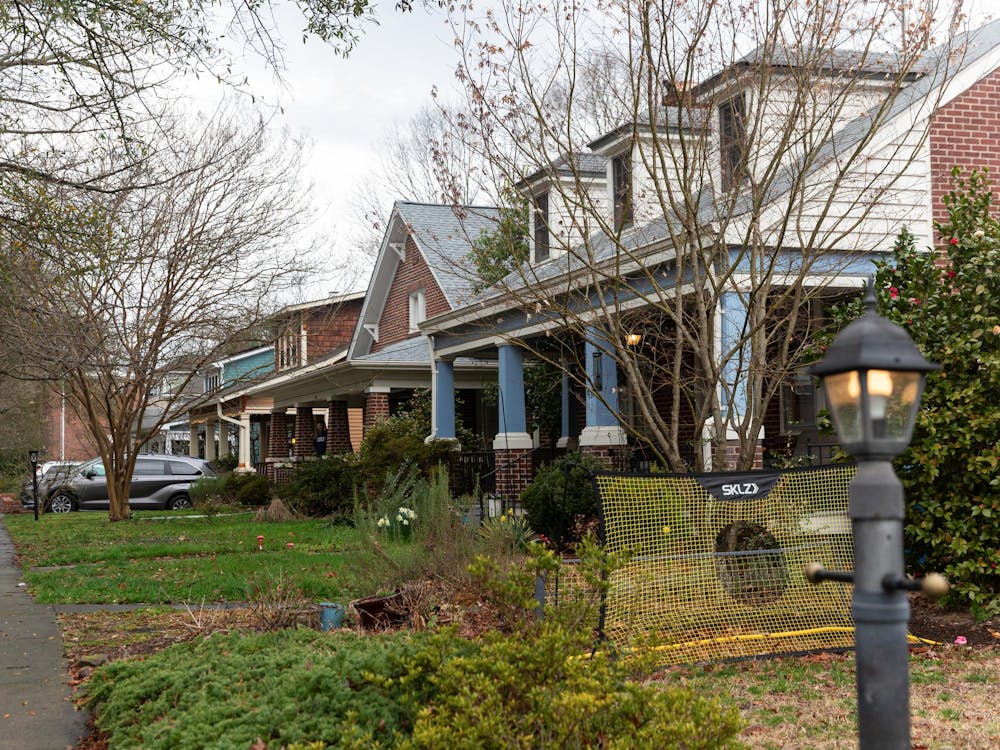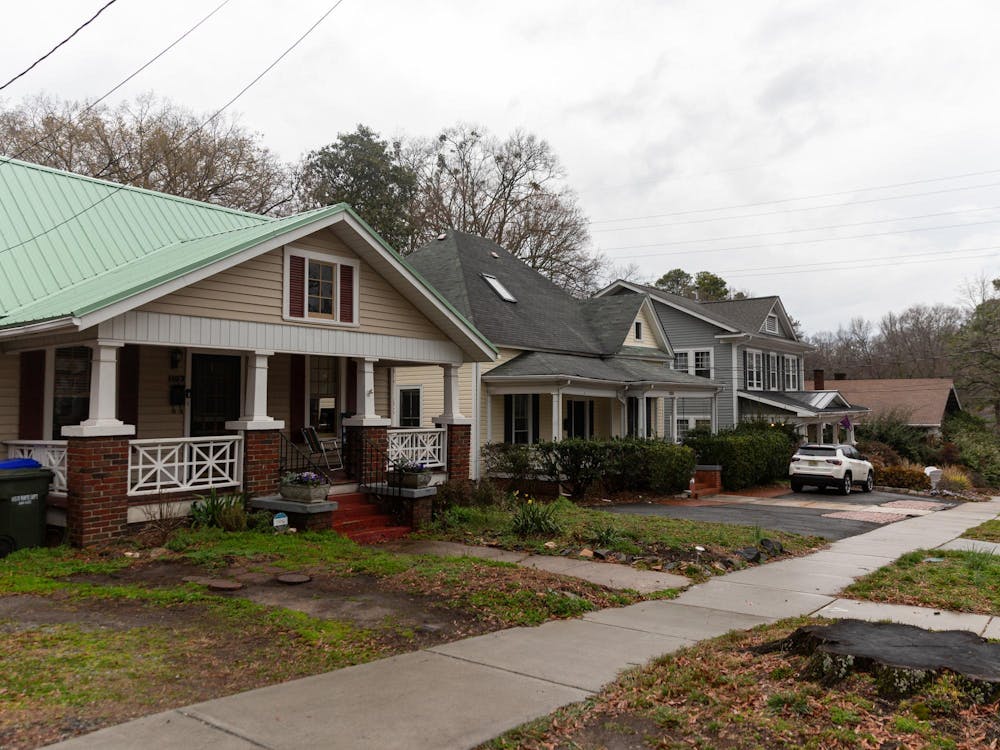Duke students involved with off-campus Greek life have experienced an increase in police responses to events through the 2023-24 academic year, with incidents spiking in January and continuing through February.
This new pattern has brought a wave of concern for Duke students who planned to rush, pledge or throw events for Greek organizations.
“Now that … a bunch of people got caught in a house, anxiety looms at parties about the idea of cops showing up,” said a Kappa Alpha Theta sister, who requested anonymity out of fear of retribution. “It was a lot scarier than it was before all those citations.”
Many students feel that this increase is unprecedented, and some linked the increase in police presence to the implementation of the “Good Neighbor Program,” a new initiative streamlining communication between Duke and partnered neighborhoods.
“One of the goals of the Good Neighbor Program is to provide students with the necessary resources and support for off-campus living, while promoting good citizenship within the community,” wrote Elinor Landess, director of off-campus and community life and associate dean of students, in an email to The Chronicle when asked about the students’ allegations.
“The program is designed to benefit all Duke students and neighbors living near campus, which includes Greek-affiliated students who live in near-campus neighborhoods,” she continued. “Our partnerships with Durham neighborhoods and the Durham Police Department are geared toward ensuring that all community members, including Duke students, can be good neighbors and live in harmony.”
Spring semester crackdowns
Multiple fraternities, including Durham chapters of Alpha Delta Phi, Alpha Epsilon Pi, Sigma Chi and Pi Kappa Phi and all-male selective living group Wayne Manor had noise complaints issued on their addresses, according to Durham Police Department records over two weeks in January.
These complaints resulted in a series of knocks on doors telling students to leave and a handful of arrests by police.
Police reports on fraternity houses indicate that the number of calls by concerned neighbors has disproportionately increased for some fraternities since August 2023.
Affiliated members shared details about two of the earliest incidents on the night of Jan. 18 and early morning of Jan. 19. The Chronicle obtained the arrest records of a member of the Durham chapter of Alpha Epsilon Pi’s executive board, who was cited after students were found on the roof and allegedly created a fire hazard. Over forty Sigma Chi brothers and rushing students were lined up outside, breathalyzed, asked for identification and cited with underage drinking or supplying alcohol to minors.
All of these students subsequently had their charges dropped in the following weeks, though Sigma Chi has since stopped holding parties at the residence where the events of that night took place.

Alpha Epsilon Pi and Sigma Chi’s presidents did not respond to requests for comment on that night’s events, nor did the Durham Interfraternity Council.
First-year Ben Maschler, who accepted a bid for Alpha Epsilon Pi, commented on the night's events and the brothers’ responses to it.
“With the frat that I'm pledging, it's just been noise complaints,” Maschler said. “The brothers are pretty good about dealing with the police and making sure that nothing ever gets too out of hand.”
Student responses
Other affiliated students were more concerned about the uptick in police presence and its implications for students.
“Quite a few guys in frats potentially have charges, which is terrifying,” said sophomore Kaitlyn Williams, a Durham Panhellenic sorority sister.
According to Williams, multiple first-years she knows were scared to accept bids to the fraternities that were most affected by police activity. These first-years declined to interview.
The anonymous sister added that people of color may have been nervous about taking bids in fraternities and sororities, due to biases in the justice system that may adversely affect them if they are arrested.
“I heard comments, especially with friends of color being a little nervous about the different ways that this would impact us in comparison to some of our white counterparts,” Williams agreed. “I think there's already a very small portion of minorities within frats and sororities, and [the police presence] aren’t an appealing addition to push you to rush.”
However, other students are not worried and believe that potential police interactions will not have serious consequences.
“I think it's a temporary scare for most people, and I think that Greek life is really clouded with privilege. A lot of people that have grown up in so much privilege, like, they kind of know they don't have to worry about the repercussions, which is really upsetting. I feel like [the police] are gonna be a joke,” the anonymous sister said.
Maschler thinks that the fear of potential arrest will not disincentivize students from rushing or attending Greek events.
“There's a very strong incentive, especially for freshmen and sophomores, to go to fraternities to let loose a little bit. I don't know if the police are enough of a deterrent,” Maschler said.
Duke-surrounding neighborhood communications
These students were unsure of the cause of the crackdown, but some pointed to a new program which better connects Duke to its surrounding neighborhoods.
The Duke Student Affairs launched the Good Neighbor Program in fall 2023. The program aimed to improve communications between University administration, students living off campus and partnered neighborhoods where many fraternity houses are located.
“The program communicates directly with Durham residents who live close to our students. We want our neighbors to know they can reach out with any questions they have, and the university maintains the same expectations for our students living off campus as we do for those living on campus,” Landess said. “The Duke Good Neighbor Program and our messaging focuses on the neighborhoods where most of our students live.”
The program aims to “cast a broad net with communications” to reach all students, including those in Greek organizations, Landess noted.
The messaging from the Good Neighbor Program coincides with an increase in noise complaints about fraternity houses since the start of the spring semester, as well as the increase in arrests.
“We just further perpetuate the stereotype of being poor neighbors to the Durham community. I think there's always been this kind of belief that Duke students think they're better than Durham,” Williams said.
“Us existing [in] residential neighborhoods right next to families who are trying to go to bed at 11 p.m. on a Thursday doesn't help with that image whatsoever. I think it creates this weird perception that Durham is just a playground for Duke students to use,” she continued.
Multiple students felt, though, that this poor image is rooted in the disaffiliation of Greek organizations from the university, which forced them off campus into residential neighborhoods.
“Greek life is a pretty f***ed up system. But when it got pushed off campus now it's Durham's responsibility … It's worse for the residents of Durham and pushes the idea that Duke students are privileged, loud partyers and don't have any respect,” the anonymous source said. “Parties are going to happen regardless. So just pushing them off campus and letting kids get citations is fascinating.”
Correction: A previous version of this article attributed the Good Neighbor Program to the Duke-Durham Neighborhood Partnership. It has since been updated to reflect that it is under Student Affairs. The Chronicle regrets the error.
Get The Chronicle straight to your inbox
Signup for our weekly newsletter. Cancel at any time.
Halle Vazquez is a Trinity first-year and a staff reporter for the news department.

